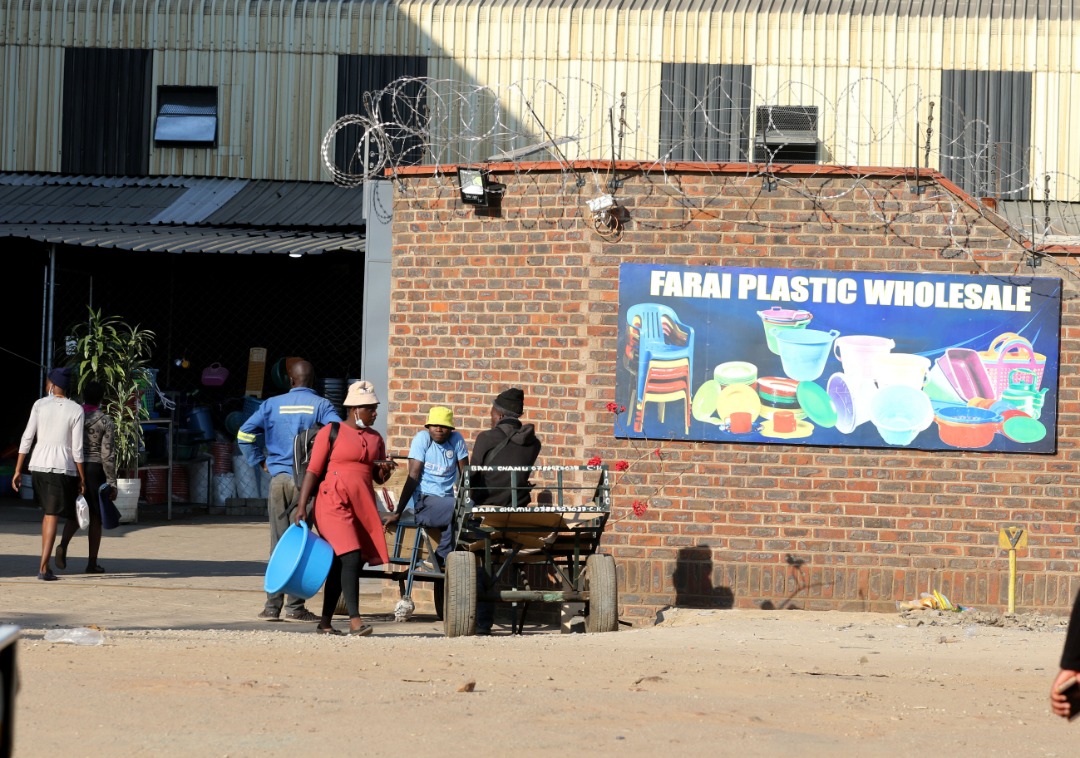
BY EVANS MATHANDA HLELANI Ntonga returned home recently after 10 years in the United States to discover that plasticware had taken over Harare’s Graniteside industrial area where he had been formerly employed at a diversified agri-business company, interfresh.
When he left Zimbabwe in 2012, Graniteside industrial area was booming with companies engaged in general engineering and manufacturing of books, shoes, blankets, electronic goods, confectionaries and whole other range of goods.
But walking through the Graniteside industrial area today, Ntonga was greeted by a variety of plastic products, including buckets, dishes and plates being sold from most of the industrial spaces in the area.

He was mesmerised by the multitudes of people carrying plasticware along most of the roads in the industrial area.
Graniteside has been transformed into a plastic city. “I worked at Interfresh for nearly seven years until I was forced to relocate due to the country’s economic downturn. In Graniteside alone, the enterprise (Interfresh) had the capacity to employ approximately 2 000 people,” Ntonga told NewsDay.
“I had acquaintances who worked at different companies such as Sara Shoes, Pridium Investments and Mazongororo Books, to name a few. All of these businesses were primarily for the sake of production, and they had a significant impact on our economy. But now, when I returned home, I am astounded to see how the Graniteside industrial area has been reduced to a mere plastic compound, in fact, a China Mall.”
Interfresh Limited was delisted from the Zimbabwe Stock Exchange (ZSE) after the horticulture company voluntarily removed itself from the bourse. The delisting took place on December 31, 2013 and since then the enterprise has been reduced to almost a shell after late former President Robert Mugabe grabbed the company’s properties in Mazowe.
Graniteside used to be a light industrial site with enterprises that had an impact on Zimbabwe’s economy, according to a former vendor who traded in the area for years.
- Chamisa under fire over US$120K donation
- Mavhunga puts DeMbare into Chibuku quarterfinals
- Pension funds bet on Cabora Bassa oilfields
- Councils defy govt fire tender directive
Keep Reading
“I was a vendor in Granitesite for 17 years where I used to sell fruits, soft drinks and bread at Corner Bessemer and Strand,” recalled the former vendor who asked not to be named.
“I had regular customers from companies like Wonder Fabrics, JVC, Ecofry and Mazongororo Books who made me to be who I am today. Graniteside was an industry for different companies doing different businesses unlike now where it has turned into a plastic complex. I left vending in 2019 when Graniteside was invaded by the Chinese plastic companies and up until today I do not see the major benefit of such plastics to our economy,” said the former vendor.
The Industry and Commerce ministry refused to elaborate on the plastic business sector, but said the industry was just emerging and more research was needed.
Yan Xui, general manager at Farai Plastics, however, said plastics had a number of immediate economic benefits and could help with resource efficiency.
“It extends the shelf life of food, reducing food waste and its light weight decreases fuel use for moving items. Plastics contribute to environmental protection by minimising trash, cutting greenhouse gas emissions, and conserving energy at home, work, and on the road. Plastics provide the following advantages: long-lasting material, low cost, water resistance, and low energy consumption. However, we cannot overlook the fact that plastics emit poisonous vapours, cause low temperatures, and contribute to climate change,” he said.
But Gift Mugano, an economist, pointed out that people were concerned about the rapid disappearance of the original Graniteside, which represented a once vibrant local manufacturing industry.
“From my end, it is more about understanding what is causing the closure of companies. I would want to argue that Graniteside is one example. You go to Bulawayo’s Belmont industrial area, it is the same situation, go even to Workington, same situation,” he said.
“The major issue here is that in Zimbabwe the economic environment has become very unstable. Let us not forget that we are now in more than two decades of economic turmoil. From 1998-2008, we lost our currency, we lost our savings everyone went zero and that is when most companies closed.”
The growth of the plastic business in Zimbabwe comes as global concern mounts over plastic pollution.
While the country’s emerging plastic industry is anchored on recycling plastics, the recycling process ends at some point when the plastics can no longer be recycled which has resulted in many economies pushing for a complete ban on plastic use.
The government has so far banned the use of polystyrene material, often known as kaylites, and other associated plastic packaging, citing health and pollution concerns. The fast food business and vendors were mostly affected by the ban.
- Follow Evans on Twitter @EvansMathanda19










